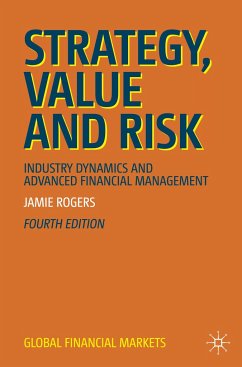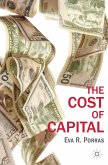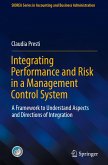The current transformation of the global economy is being driven by new fundamental innovations, digitalization, industry dynamics and climate change. The impact of this transformation in terms of value migration, industry boundaries, investment and firm continuity is vast. The fourth edition of Strategy, Value and Risk examines these issues, and how they will influence firms and industries in the future. Those aspects of the business environment that will have a significant impact on strategy, business models, investments and value are identified, and the accounting, finance, economic and quantitative principles that provide a foundation for the analysis of these issues are discussed.
Part I: Strategy, Value and Risk provides the strategic, economic, accounting and financial framework. Strategy discusses technology and innovation, industry dynamics, globalization and industry concentration, climate change, industry boundaries and future value. Value discusses the accounting framework and corporate finance and investment, while Risk covers investment risk, corporate risk management and value and risk. Part II: Quantitative Analytics provides an overview of financial statistics, derivatives and derivative applications, and provides a background on the financial economics used in the analysis of physical, intangible, financial and energy assets. Part III: The Analysis of Investments, Transformation and Value examines platforms, data and analytics, the energy sector, pharmaceutical and biotech, a growth firm and media transformation, and applies the accounting, economic, financial and quantitative concepts.
This fourth edition lays out scenarios that will likely shape firms and industries in the future, and has relevance to CFOs, corporate finance and investment professionals. Business model disruption, data and analytics, intangible assets and dynamic analysis are now key issues within the CFO role. Investment professionals are required tosee the larger economic environment in which firms compete, assess a firm's industry and its position within that industry, recognize which investments best serve its broad strategic goals and identify a firm's capabilities and options.
A background in the accounting, finance, economic, quantitative and valuation concepts that are relevant to the digital economy, new industries, business models and technologies is essential for finance professionals. This book addresses these issues within the context of the fundamental changes underway in the global economy, and provides applications of the techniques to illustrate the concepts.
Part I: Strategy, Value and Risk provides the strategic, economic, accounting and financial framework. Strategy discusses technology and innovation, industry dynamics, globalization and industry concentration, climate change, industry boundaries and future value. Value discusses the accounting framework and corporate finance and investment, while Risk covers investment risk, corporate risk management and value and risk. Part II: Quantitative Analytics provides an overview of financial statistics, derivatives and derivative applications, and provides a background on the financial economics used in the analysis of physical, intangible, financial and energy assets. Part III: The Analysis of Investments, Transformation and Value examines platforms, data and analytics, the energy sector, pharmaceutical and biotech, a growth firm and media transformation, and applies the accounting, economic, financial and quantitative concepts.
This fourth edition lays out scenarios that will likely shape firms and industries in the future, and has relevance to CFOs, corporate finance and investment professionals. Business model disruption, data and analytics, intangible assets and dynamic analysis are now key issues within the CFO role. Investment professionals are required tosee the larger economic environment in which firms compete, assess a firm's industry and its position within that industry, recognize which investments best serve its broad strategic goals and identify a firm's capabilities and options.
A background in the accounting, finance, economic, quantitative and valuation concepts that are relevant to the digital economy, new industries, business models and technologies is essential for finance professionals. This book addresses these issues within the context of the fundamental changes underway in the global economy, and provides applications of the techniques to illustrate the concepts.
'For the reader looking for a clear and concise introduction to real options, this book hits the spot. While the focus is on real options analysis, Rogers provides a pleasing blend of financial engineering, modern finance, and accounting-based valuation, all with the view of understanding the value from strategies and all under the eye of an informed, experienced practitioner' - Stephen H. Penman, George O. May Professor of Accounting, Columbia Business School, New York, USA
"Real option theory represents an innovative approach to valuation. This book does a sound job of blending theory and practice. The inclusion of case studies is useful. The addition of material on corporate finance theory and financial statement in the Second Edition enhances the utility of the book." - Satyajit Das, Risk Consultant and Author
"Jamie Rogers' compact treatment of real options invites managers to learn the field by studying its stories and successes, with just enough theory to demonstrate the rigor of thought beyond the case studies. No manager can fully understand modern strategy and valuation without some knowledge of real options, and this book provides a strong starting point." - David C. Shimko, Chief Risk Officer, NewOak Capital, New York, USA
'The idea that options exist in almost every decision scenario is intuitively sensible. What we need to do is recognize them, assess their value and include that value in the decision making process. This concisebook effectively gets those two basic ideas over in a manner that can be understood by even the most mathematically-challenges executives.' - Maria Barbera, Innovations E-newsletter
"Real option theory represents an innovative approach to valuation. This book does a sound job of blending theory and practice. The inclusion of case studies is useful. The addition of material on corporate finance theory and financial statement in the Second Edition enhances the utility of the book." - Satyajit Das, Risk Consultant and Author
"Jamie Rogers' compact treatment of real options invites managers to learn the field by studying its stories and successes, with just enough theory to demonstrate the rigor of thought beyond the case studies. No manager can fully understand modern strategy and valuation without some knowledge of real options, and this book provides a strong starting point." - David C. Shimko, Chief Risk Officer, NewOak Capital, New York, USA
'The idea that options exist in almost every decision scenario is intuitively sensible. What we need to do is recognize them, assess their value and include that value in the decision making process. This concisebook effectively gets those two basic ideas over in a manner that can be understood by even the most mathematically-challenges executives.' - Maria Barbera, Innovations E-newsletter








